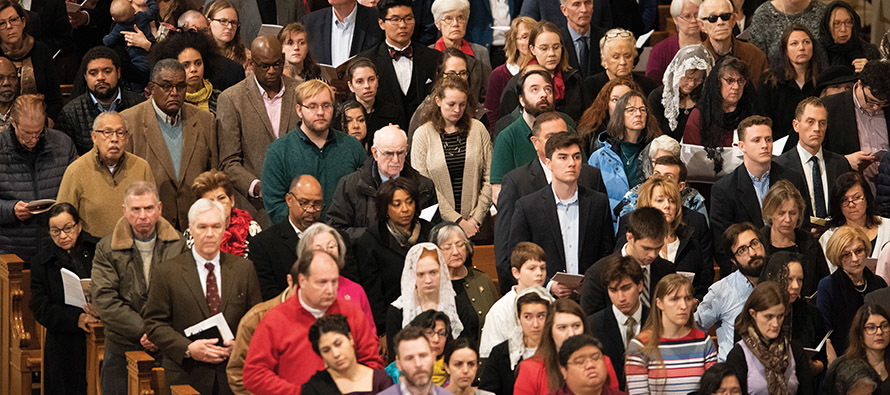Church defined: Jesus calls; we respond

The church exists to carry on the mission of Jesus, to build the kingdom of God. How that looks has varied in different places and times. (Photo by Jeffrey Bruno, JeffreyBruno.com.)
AT THE HEART of the church is vocation. The earliest idea of what is today called “church” starts with the Greek word ekklesia, which is only found twice in the gospels, both times in Matthew, and means those who have been “called out.” Jesus “calls out” all who follow him to share in his ministry in different ways.
Before Jesus even preached, healed someone, or performed a miracle, he called people to follow him. At the beginning of Jesus’ ministry, after his Baptism and temptation in the wilderness, the first thing he did was to call two sets of brothers. He asks Simon and Andrew and then James and John to follow him (Mark 1:16-20). And that is the church in its simplest terms: the followers of Jesus Christ.
Jesus came proclaiming the kingdom, or reign, of God, and it was essential that people responded to that call for the sake of salvation. Even more, though, Jesus chose people to share in his ministry so that the message could be brought more widely, that is, to everyone. Twelve apostles were “appointed,” called “to be with him,” and “sent out to proclaim the message” (Mark 3:13-19). Jesus sent “them out two by two,” instructing them to proclaim “that all should repent” (Mark 6:7-13).
The same, and changing
The church’s growth and change allows it to become what it is intended to be: the Body of Christ that is to serve the needs of those both inside and outside the church. The church continues to develop throughout history so that it can fulfill its mission to bring the gospel to the world.
While the mission of the church—the calling and gathering of people as followers of Jesus Christ for the purpose of salvation—is the same as it was when Jesus first proclaimed the gospel and chose the apostles, soon after this early date things in the church began to change. Already in the Acts of the Apostles people were being called specifically to serve Greek-speaking Christians (Acts 6:1-6), and in the second century Ignatius, the bishop of Antioch, spoke of the positions of bishop, priest, and deacon necessary to serve the needs of the growing Christian church.
“There is a growth in the understanding of the realities and the words which have been handed down,” says the Second Vatican Council’s Dogmatic Constitution on Divine Revelation (Dei Verbum, no. 8). Sometimes that’s because the church needs to refocus on its central mission; sometimes it’s because the culture has changed, making the means by which the church has expressed itself less relevant for the current day; and sometimes it might mean that the church is encountering a new culture and finding the best ways to proclaim the gospel in a fresh context. The church must meet and speak to people where they are, and what the church stresses will depend upon the people or culture in which it finds itself. Some examples:
• The internet is a global culture, which requires the presence of the gospel if all peoples are to encounter Jesus. How should the successors of the apostles evangelize online?
• The Western world is less focused on titles and authority than it used to be. So the question today is how should the church bring its message to people less interested in the institutional church and suspicious of institutions in general?
• How does one speak to many people today who are not convinced of the need for God and other fundamental beliefs of the church?
• Pope Francis is not altering the mission of the church in his writing or preaching, but he is emphasizing different aspects of the gospel message and challenging the church to rediscover and reinvigorate itself.
Followers of Jesus
Christians are still calling people to come to the church, God’s gathered people here on Earth, in order to enter into a relationship with Jesus Christ and prepare for eternal life in the reign of God. It is a task that requires new approaches to answer the ancient and eternal call, “Follow me.”
A version of this article originally appeared in Vision 2015. Related article: VocationNetwork.org, “Following Jesus: Be ready for some surprises.”
Tags
Related
- What Catholics believe about the Eucharist
- How Jesus embraced his call
- Prayer: Our never-ending conversation with God
- What the church is teaching—and learning—about the sin of racism
- A Creed to believe in
- On whose authority?
- Ten great things about being Catholic
- Following Jesus: Be ready for some surprises
- Enter into the divine
- What Catholics believe about Jesus Read More
Most Viewed
- Find your spirituality type quiz
- FAQs: Frequently asked questions about vocations
- Celibacy quiz: Can you live a celibate life?
- Resources for older discerners or those with physical and developmental differences
- About Vocation Network and VISION Guide


